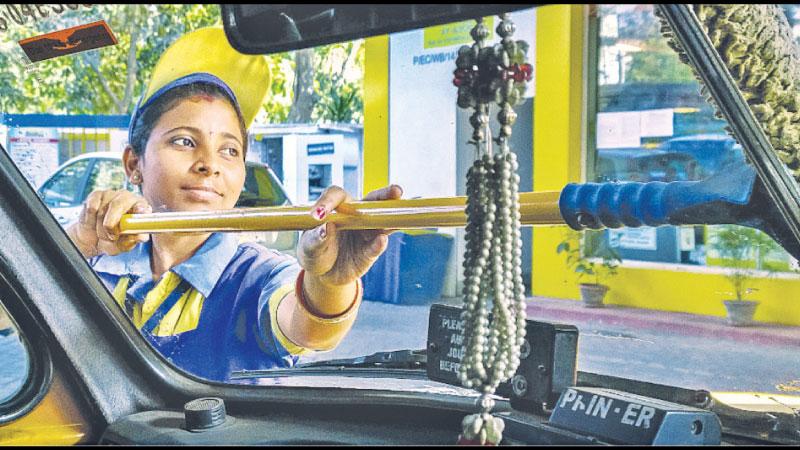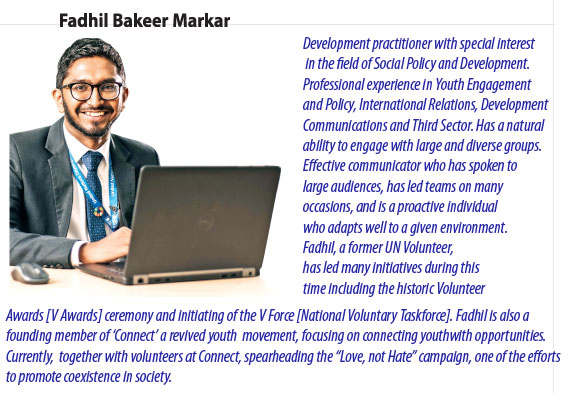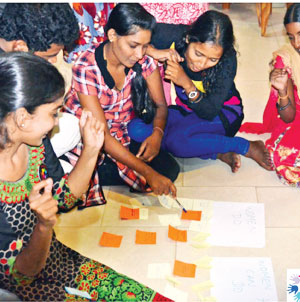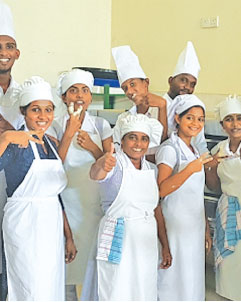
“A ccording to the recent research published by the Institute of Professional Studies, over a quarter of the population between the ages of 15 – 24 years in Sri Lanka are not included in the system of education, employment or training,” speaking to the Youth Observer, said Fadhil Bakeer Marker, Partnership and Engagement Team Lead of Youth and Innovation program, United Nations Development Program (UNDP) Sri Lanka , marking the World Youth Skill Day, which is officially celebrated on July 15 (tomorrow) every year worldwide.
“26.1 percent is quite a big number and without engaging in education, employment or training what are they doing in life is questionable. Through the UNDP Youth Development Program, we are keen to build on our journey of learning and skills and impart it to young people in the country,” Fadhil further added.
Today, there are 1.2 billion young people aged 15 to 24 years, accounting for 16 percent of the global population which is the largest the world has ever known. Globally it is a known fact that, young people are almost three times more likely to be unemployed than adults and are continuously exposed to lower quality jobs, greater labour market inequalities and longer and more insecure school-to-work transitions. In addition, women are more likely to be underemployed and under-paid and have to undertake part-time jobs or work under temporary contracts. These challenges are important to all of us but especially to the young people who make up more than half the world’s population today. In Sri Lanka, young people make up nearly a quarter of the population. Therefore, the importance of innovatively engaging with and responding to the needs of this generation of young people cannot be overstated. Having identified all the disparities and issues statistically that the youth face in their day today life, the perception of young people in society is a big issue that is difficult to solve only through development projects. It also needs a radical change in the mindset of adults to consider young people as leaders of society. “Do we take young people and their perception of life seriously, is a serious issue locally as well as globally,” said Fadhil.
Quoting Prof. Siri Hettige he said, it is so important to engage with young people at every decision-making level because they are the most updated versions of the society. “I think it’s very true and however, it is the hardest thing to achieve too,” Fadhil said.
“Looking at the World Youth Skills Day, although we are talking about huge technological improvement, contrarily we also have to admit the fact that there is a huge gap in educational skills among youth in the country that has to be addressed immediately. We are currently moving in a trajectory towards the fourth industrial revolution and we are talking about machine learning, Artificial Intelligence and so much more. How do we provide these skills to young people is the main focus of WYSD 2019 and this is why engaging with youth and innovation is a top priority for UNDP,”
Under Youth and Innovation Programs, the UNDP has initiated so many programs and projects to facilitate youth and especially the vulnerable youth in the country that are not getting the same kind of opportunity to live equally in society.
“We cannot eliminate disabled youth, young widows and orphans from the development process and it’s very important to find ways in which we can integrate them into the process meaningfully and provide them with the right opportunities to be able to win the world by enhancing their abilities in life,” he said.
Citra Social Innovation Lab, HackaDev National Youth Social Innovation Challenge, Comprehensive Youth Development Program, HackaDev Digital for Social Innovation Incubator, Youth Leads Program and Youth Co., Lab Technopreneurship for Socail Change are some notable projects run by the UNDP with the collaboration of the Ministry of Science, Technology and Research, Ministry of National Policies, Economic Affairs, Resettlement and Rehabilitation .
The Youth Leads Program is one of the key programs run by the UNDP and it was first introduced in 2015 as another step forward in opening the UNDP to the young people of the country.
A cohort of four young dynamic young people would be chosen to work within the core areas on the UNDP’s portfolio for fifty percent of their time – such as governance, environment and support teams while the other half of their time would be spent working together as a team furthering the innovation portfolio of the UNDP.
This model is currently used by many UNDP offices in the region and in 2017 Youth Leads Program was shortlisted as one of the best under 35 teams in Asia Pacific by Govlnsider.
“Youth Leads Program is our core walk-talk program where we started four years ago. We got four young people joining the UNDP team as freshers, just passed out from school and with no big expectations. And they spent 50 percent of their time with the UNDP team and engaged in work and the balance 50 percent of their time have been allocated for thinking outside the box and being innovative and bringing novel ideas for the ongoing UNDP projects that they have been engaged with. The program was quite a success. HackaDev is also one of the thriving projects we are engaged in with the assistance of Ministry of Digital Infrastructure and ICTA, National Youth Services Council and ICT. In 2018, we had our biggest program which reached directly and indirectly to more than 6000 youth across the island meaningfully engaged them by bringing their technological abilities to solve social issues and become entrepreneurs through their own skills,” Fadhil explained.
“At the moment all the six projects which are running under UNPD – the Youth and Innovation Program is a great success and we hope to expand these program as much as possible island wide to get more youth into the training and development process and help them to enhance their skills in the area that they are capable of,” Fadhil further added.
The United Nations at its General Assembly in November 2014 declared July 15 as world Youth Skills Day.
